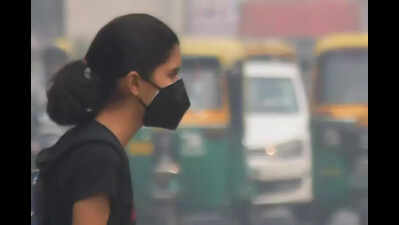- News
- City News
- delhi News
- Delhi interventions to tackle air pollution
Trending
Delhi interventions to tackle air pollution
New Delhi: Around 159 tonnes of road dust is collected daily in the city, water is sprinkled on nearly 1,995km of roads to stifle dust and 164 places have been deemed vulnerable to dumping of industrial waste. These are among the interventions made by Delhi govt's environment department to deal with air pollution along with other departments.
A new report by the environment department titled ‘Management interventions to mitigate air pollution in Delhi' has outlined 11 areas to tackle air pollution. It includes dust management from construction and demolition activities, mitigation of dust from roads and open areas, control of fires in sanitary landfills, prevention of open burning of municipal solid waste and biomass, electric mobility, vehicular pollution control, augmentation of public transport, effective grievance redressal, greening and plantation programmes, abating pollution caused by diesel generators and other actions under Stage III and IV of the Graded Response Action Plan.
You Can Also Check: Delhi AQI | Weather in Delhi | Bank Holidays in Delhi | Public Holidays in Delhi
To deal with dust pollution, 86 mechanised road sweeping (MRS) machines were deployed in March. According to the report, MCD requires 168 MRS as one machine is required for sweeping 40 km. Though MCD currently has 52 MRS, 99 MRS are in the process of being acquired. NDMC, which needs nine MRS, has six and is in the process of getting six more.
According to the report, 134 road stretches with maximum congestion have been identified in the city. Around 62.3 lakh 10–15-year-old vehicles have been de-registered till March 31. Moreover, 7,686 vehicles were impounded and sent for scrapping this year till March 31.
Of the total plantation target of 64.1 lakh saplings in 2024-25, around 97% (62.7 lakh) has been achieved till March.
Environmental activist Bhavreen Kandhari said the report offers a familiar checklist of measures but lacks a critical lens on effectiveness and outcomes. "The report projects optimism without fully accounting for why air pollution trends remain stagnant or worsening in many areas," she said. "For instance, the decline in 'severe' AQI days is presented as a major success, yet the report avoids explaining the broader trend of PM2.5 levels remaining dangerously high. What Delhi needs now is not just more action, but better action, and a willingness to rethink what's not working."
End of Article
Follow Us On Social Media









